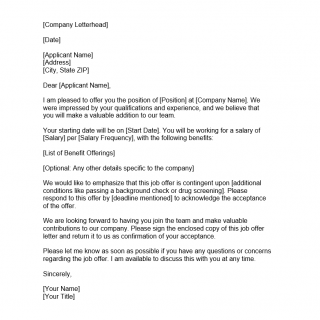Job Offer Letter
A job offer letter is a formal document from an employer to a prospective employee, offering employment for a specific position for a specified period, which may be a full-time or part-time job. The letter usually outlines the terms and conditions of the employment, such as salary, benefits, job title, start date, and hours of work.
The job offer letter typically consists of the following parts:
- Introduction: The letter begins by addressing the candidate and expressing the employer’s excitement at offering them the job.
- Position: The job title and department/branch for which the candidate has been selected will be mentioned.
- Salary: The salary, payment frequency and other compensation details, such as bonus or commission structure, are included in the letter.
- Benefits: The letter may detail additional benefits such as healthcare, retirement, paid time off, or other perks available to the employee.
- Start Date: The start date for the employee is mentioned in the letter.
- Job description: A brief description of the duties and responsibilities of the job is mentioned.
- Background check: An offer letter may be conditional upon the candidate passing a background check.
- Company policies: The letter may provide a summary of the company's policies.
- To Accept the Offer: It concludes with the request for a written acceptance of the offer and any instructions for the candidate.
The most important fields in a job offer letter are the position, salary, benefits, and start date. These should be clearly outlined, with no doubt left in the candidates' minds as to the offer's specifics.
The job offer letter is compiled in cases when an employer wants to make a formal job offer to a candidate. It is typically the final stage of the hiring process after the employer has conducted interviews and selected the ideal candidate.
When compiling a job offer letter, there are several features to consider, such as the candidate's work experience, the nature of the job, and the company's compensation structure. The letter should be clear, concise, and professionally written to ensure understanding and prevent misinterpretation.
Offer letter sample:
[Company Letterhead]
[Date]
[Applicant Name]
[Address]
[City, State ZIP]Dear [Applicant Name],
I am pleased to offer you the position of [Position] at [Company Name]. We were impressed by your qualifications and experience, and we believe that you will make a valuable addition to our team.
Your starting date will be on [Start Date]. You will be working for a salary of [Salary] per [Salary Frequency], with the following benefits:
[List of Benefit Offerings]
[Optional: Any other details specific to the company]
We would like to emphasize that this job offer is contingent upon [additional conditions like passing a background check or drug screening]. Please respond to this offer by [deadline mentioned] to acknowledge the acceptance of the offer.
We are looking forward to having you join the team and make valuable contributions to our company. Please sign the enclosed copy of this job offer letter and return it to us as confirmation of your acceptance.
Please let me know as soon as possible if you have any questions or concerns regarding the job offer. I am available to discuss this with you at any time.
Sincerely,
[Your Name]
[Your Title]
Some advantages of a job offer letter include providing a clear outline of the job and the terms of employment to the candidate, which helps in setting expectations and reducing misunderstandings. It also helps to create a positive first impression of the organization as a professional and well-organized employer.
There can be problems when filling out the job offer letter if the employer does not have accurate information, a clear outline of the job, or knowledge of the candidate's abilities.
Examples of related forms include the offer of employment letter, employment contract, and letter of intent for employment, which differ slightly in their purpose and scope.
The employer usually sends the job offer letter by email or postal mail to the candidate. Once the candidate has signed and returned the letter agreeing to the job offer, it becomes a binding agreement. The employer should keep a copy of the letter and any other related documentation in the employee's personnel file.

